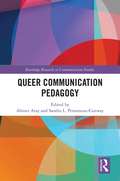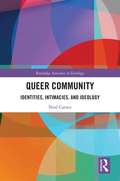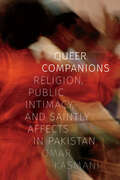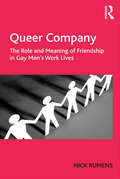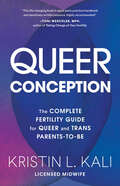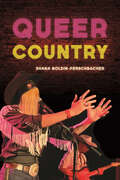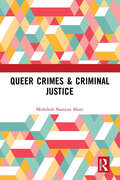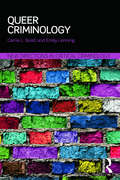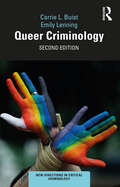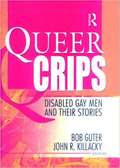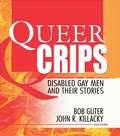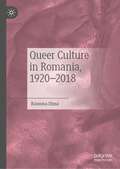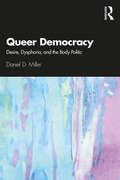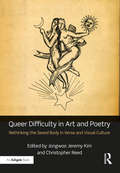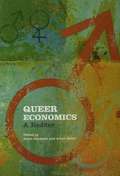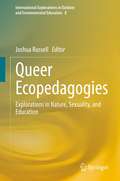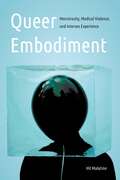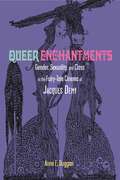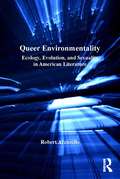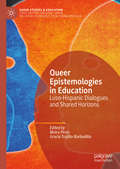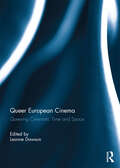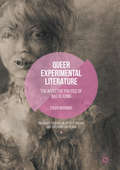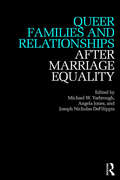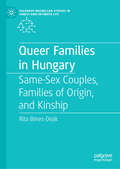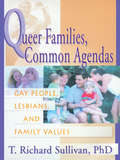- Table View
- List View
Queer Communication Pedagogy (Routledge Research in Communication Studies)
by Ahmet Atay Sandra L. Pensoneau-ConwayThis book addresses queer issues and current events from a communication perspective to articulate a queer communication pedagogy. Through putting communication pedagogy and queer studies into dialogue, the book investigates how queer theory and critical communication pedagogy intersect in pedagogical spaces. The chapters identify institutional and educational barriers, oppressions, and issues pertaining to queer lives in the context of higher education. Using a variety of critical methodological approaches (including dialogic methods, autoethnography, performative writing, and visual methods), each chapter theorizes a queer communication pedagogy, and offers a path toward and innovative ideas about materializing queer communication pedagogy as a disciplinary endeavor. This book will be of interest to scholars, graduate students, and upper-level undergraduate students in Communication Studies, Critical Communication Pedagogy, Intercultural Communication, Higher Education, Public Pedagogy, and Queer Studies, and Critical/Cultural Studies.
Queer Community: Identities, Intimacies, and Ideology (Routledge Advances in Sociology)
by Neal CarnesThe context for this work is defined by a second wave of social and political activity contextualized by queer. For example, three, self-identified black, queer women started the Black Lives Matter movement. For a new generation, the first-wave reclamation of queer speaks to their position in a world that continues to marginalize and oppress, particularly sexually and gender fluid and non-normative people. Using empirical work carried out by the author, Queer Community describes queer-identified people, their intimate relationships, and how they are evolving as a unique community along politically-charged, ideological lines. Following an exploration of the history and context of ‘queer’ – including activism and the evolution of queer theory – this book examines how queer-identified people define the identity, with reference to ‘queer’ as a sexual moniker, gender moniker, and political ideology. Queer Community will appeal to scholars and students interested in sociology, queer theory, sexuality studies, gender studies, cultural studies, and contemporary social movements.
Queer Companions: Religion, Public Intimacy, and Saintly Affects in Pakistan
by Omar KasmaniIn Queer Companions Omar Kasmani theorizes saintly intimacy and the construction of queer social relations at Pakistan’s most important site of Sufi pilgrimage. Conjoining queer theory and the anthropology of Islam, Kasmani outlines the felt and enfleshed ways in which saintly affections bind individuals, society, and the state in Pakistan through a public architecture of intimacy. Islamic saints become lovers and queer companions just as a religious universe is made valuable to critical and queer forms of thinking. Focusing on the lives of ascetics known as fakirs in Pakistan, Kasmani shows how the affective bonds with the place’s patron saint, a thirteenth-century antinomian mystic, foster unstraight modes of living in the present. In a national context where religious shrines are entangled in the state’s infrastructures of governance, coming close to saints further entails a drawing near to more-than-official histories and public forms of affect. Through various fakir life stories, Kasmani contends that this intimacy offers a form of queer world making with saints.
Queer Company: The Role and Meaning of Friendship in Gay Men's Work Lives
by Nick RumensDrawn from in-depth qualitative research, Queer Company provides the first extended, academic analysis of gay men's workplace friendships, offering theoretical and empirical insights into a subject that is timely and important. Although theoretically framed in poststructuralism and the sociology of friendship, this book also draws on feminism, organisation studies, gender and sexuality studies to explore the diverse roles and meanings of gay men's workplace friendships. Shedding light on the significance of workplace friendship for those who participate in them, particularly in terms of how these workplace relationships can help gay men to construct meaningful identities and selves, Queer Company examines the manner in which gay men’s workplace friendships are established, developed and organised, whilst considering the effects of organisational contexts upon friendship processes. A detailed investigation of the links between friendship, sexuality, gender and intimacy in the workplace, this book will appeal to scholars of management studies as well as sociologists with interests in gender and sexuality, the sociology of organisations and cultural studies.
Queer Conception: The Complete Fertility Guide for Queer and Trans Parents-to-Be
by Kristin Liam KaliMaking a baby through love and science? Get the guidance you need to navigate the conception process with confidence and ease.&“[A] a well-researched, deeply comprehensive (and readable!) guide to building a queer family in a way that works for you.&” —Emily Oster, author of Expecting BetterThe only evidence-based, up-to-date fertility guide for queer people from an experienced health care provider, this is also the first to be transgender inclusive and body-positive. Here, queer prospective parents will find sound advice for navigating complex medical, social and financial decisions. Trusted fertility midwife Kristin Kali walks you through the baby-making process: creating a timeline; fertile health for every body; preconception tests; identifying ovulation; donors, gamete banks, and surrogacy; methods of insemination including IUI, IVF and reciprocal IVF; navigating early pregnancy; and preparing for infant feeding, including lactation induction for trans women and nongestational parents. This book is for all LGBTQ+ readers interested in creating family through pregnancy: anyone who identifies as queer, lesbians, gay men, bisexual people, trans and nonbinary people, couples, single parents by choice, poly families, and coparents. It&’s an antidote to a culture and medical system that all too often centers heterosexual couples experiencing infertility while overlooking our unique needs. It also contains sidebars with guidance for reproductive healthcare professionals.&“This life-changing book is equal parts practical handbook and sensitively written resource. Highly recommended!&”—Toni Weschler, MPH, author of Taking Charge of Your Fertility
Queer Country (Music in American Life)
by Shana Goldin-PerschbacherThough frequently ignored by the music mainstream, queer and transgender country and Americana artists have made essential contributions as musicians, performers, songwriters, and producers. Queer Country blends ethnographic research with analysis and history to provide the first in-depth study of these artists and their work. Shana Goldin-Perschbacher delves into the careers of well-known lesbian artists like k.d. lang and Amy Ray and examines the unlikely success of singer-songwriter Patrick Haggerty, who found fame forty years after releasing the first out gay country album. She also focuses on later figures like nonbinary transgender musician Rae Spoon and renowned drag queen country artist Trixie Mattel; and on recent breakthrough artists like Orville Peck, Amythyst Kiah, and chart-topping Grammy-winning phenomenon Lil Nas X. Many of these musicians place gender and sexuality front and center even as it complicates their careers. But their ongoing efforts have widened the circle of country/Americana by cultivating new audiences eager to connect with the artists’ expansive music and personal identities. Detailed and one-of-a-kind, Queer Country reinterprets country and Americana music through the lives and work of artists forced to the margins of the genre's history.
Queer Crimes & Criminal Justice
by Mithilesh Narayan BhattThe Queer/Sexual minority which interalia includes lesbian, gay, bisexual, and transgender (hereinafter LGBT) people is not a new phenomenon in today’s scenario. LGBT share a particular experience of their own sexual desires, as potentially directed toward a person of the same gender. They have transformed these experiences, desires, and practices into a social identity, a sexual orientation, which serves as a marker of individual selves and of a group. This study shows that discrimination and abuse from homophobic/transphobic world in which there is full permission to treat LGBT with cruelty makes it difficult for them to maintain a strong sense of well-being and self-esteem. Study reveals that in India LGBT lives are more secretive as they are suppress to come out easily. This book based on study concludes with some strong and viable recommendations, which are requisite to ensure safe and proper place to LGBT people in society, inculcating humane approach into laws and the criminal justice system. Education and awareness programmes through various means and various places can bring positive changes. Note: T& F does not sell or distribute the Hardback in India, Pakistan, Nepal, Bhutan, Bangladesh and Sri Lanka.
Queer Criminology (New Directions in Critical Criminology)
by Carrie Buist Emily LenningWinner of the 2016 Book Award from the American Society of Criminology, Division of Critical Criminology. In this book, Carrie L. Buist and Emily Lenning reflect on the origins of Queer Criminology, survey the foundational research and scholarship in this emerging field, and offer suggestions for the future. Covering topics such as the criminalization of queerness; the policing of Queer communities; Queer experiences in the courtroom; and the correctional control of Queer people, Queer Criminology synthesizes the work of criminologists, journalists, legal scholars, non-governmental organizations, and others to illuminate the historical and contemporary context of the Queer experience. Queer Criminology offers examples of the grave injustices that Queer people face around the world, particularly in places such as Russia, Kyrgyzstan, England, India, Thailand, Nigeria, and the United States. These injustices include, but are not limited to, selective enforcement, coerced confessions, disproportionate sentencing, rape, extortion, denial of due process, forced isolation, corporal punishment, and death. By highlighting a pattern of discriminatory, disproportionate, and abusive treatment of Queer people by the criminal legal system, this book demonstrates the importance of developing a criminology that critiques the heteronormative systems that serve to oppress Queer people around the world. Buist and Lenning argue that criminology is incomplete without a thorough recognition and understanding of these Queer experiences. Therefore, Queer Criminology is a vital contribution to the growing body of literature exploring the Queer experience, and should be considered a necessary tool for students, scholars, and practitioners alike who are seeking a more just criminal legal system.
Queer Criminology (New Directions in Critical Criminology)
by Emily Lenning Carrie L. BuistThis book surveys the growing field of Queer Criminology. It reflects on its origins, reviews its foundational research and scholarship and offers suggestions for future directions. Moreover, this book emphasizes the importance of Queer Criminology in the field and the need to move LGBTQ+ issues from the margins to the center of criminological research. Core content includes: • Contested definitions of and conceptual frameworks for Queer Criminology• The criminalization of queerness and gender identity in historical and contemporary context• The relationship between LGBTQ+ communities and law enforcement• The impact of legislation and court decisions on LGBTQ+ communities• The experiences of queer victims and offenders under correctional supervision This revised and updated edition includes new developments in theory and research, further coverage of international issues and a new chapter on victimization and offending. It is essential reading for those engaged with queer, critical, and feminist criminologies, gender studies, diversity, and criminal justice.
Queer Crips: Disabled Gay Men and Their Stories
by John R. Killacky Bob Guterthis is an anthology of essays and short stories about gay men who are also disabled. Many of the stories and essays are taken from Bent, an on-line publication that gives voice to the often silent voices of disabled gay men.
Queer Crips: Disabled Gay Men and Their Stories
by Bob Guter John R KillackyGet an inside perspective on life as a disabled gay man! Queer Crips: Disabled Gay Men and Their Stories reverberates with the sound of "cripgay" voices rising to be heard above the din of indifference and bias, oppression and ignorance. This unique collection of compelling first-person narratives is at once assertive, bold, and groundbreaking, filled with characters-and character. Through the intimacy of one-on-one storytelling, gay men with mobility and neuromuscular disorders, spinal cord injury, deafness, blindness, and AIDS, fight isolation from society-and each other-to establish a public identity and a common culture. Queer Crips features more than 30 first-hand accounts from a variety of perspectives, illuminating the reality of the everyday struggle disabled gay men face in a culture obsessed with conformist good looks. Themes include rejection, love, sex, dating rituals, gaycrip married life, and the profound difference between growing up queer and disabled, and suffering a life-altering injury or illness in adulthood. Co-edited by Bob Guter, creator and editor of the webzine BENT: A Journal of Cripgay Voices, the book includes: two performance pieces from acclaimed author and actor Greg Walloch poetry from Chris Hewitt, Joel S. Riche, Raymond Luczak, Mark Moody, and co-editor John Killacky essays from BENT contributors Blaine Waterman, Raymond J. Aguilera, Danny Kodmur, Thomas Metz, Max Verga, and Eli Clare interviews with community activist Gordon Elkins and Alan Sable, one of the first self-identified gay psychotherapists in the United States and much more! Queer Crips is a forum for neglected cripgay voices speaking words that are candid, edgy, bold, dreamy, challenging, and sexy. The book is essential reading for academics and students working in lesbian and gay studies, and disability studies, and for anyone who's ever visited the place where queerness and disability meet.
Queer Culture in Romania, 1920–2018
by Ramona DimaThis book is an in depth, extensive study of Romanian queer cultural products. It brings an essential contribution to the literature on Central and South Eastern European gender studies, post-communism studies, media, and cultural studies, as well as transnational queer studies. The book looks at Romanian queer culture ”from inside”, and from the acknowledgment that the research process is guided by the sensitivity of the approached topics, by the lack of archival footprints, and by a solid dose of media archaeology, especially when looking at the beginning of Romanian LGBT+ activism in the 90s. The book starts from contemporary Romanian cultural products that are focusing on queer topics and/or produced by queer creators. It looks back at the memories of seminal queer and trans activists in extensive interviews conducted for this volume, and fragmented literary and media sources that cover the most part of the 20th century.
Queer Democracy: Desire, Dysphoria, and the Body Politic
by Daniel D. MillerQueer Democracy undertakes an interdisciplinary critical investigation of the centuries-old metaphor of society as a body, drawing on queer and transgender accounts of embodiment as a constructive resource for reimagining politics and society. Daniel Miller argues that this metaphor has consistently expressed a desire for social and political order, grounded in the social body’s imagined normative shape or morphology. The consistent result, from the “concord” discourses of the pre-Christian Stoics, all the way through to contemporary nationalism and populism, has been the suppression of any dissent that would unmake the social body’s presumed normativity. Miller argues that the conception of embodiment at the heart of the metaphor is a fantasy, and that negative social and political reactions to dissent represent visceral, dysphoric responses to its reshaping of the social body. He argues that social body’s essential queerness, defined by fluidity and lack of a fixed morphology, spawns queer democracy, expressed through ongoing social and political practices that aim to extend liberty and equality to new social domains. Queer Democracy articulates a new departure for the ongoing development of theoretical articulations linking queer and trans theory with political theory. It will appeal to both academic and non-academic readers engaged in research on political theory, populism, US religion, gender studies, and queer studies.
Queer Difficulty in Art and Poetry: Rethinking the Sexed Body in Verse and Visual Culture
by Christopher Reed Jongwoo Jeremy KimAugmenting recent developments in theories of gender and sexuality, this anthology marks a compelling new phase in queer scholarship. Navigating notions of silence, misunderstanding, pleasure, and even affects of phobia in artworks and texts, the essays in this volume propose new and surprising ways of understanding the difficulty—even failure—of the epistemology of the closet. By treating "queer" not as an identity but as an activity, this book represents a divergence from previous approaches associated with Lesbian and Gay Studies. The authors in this anthology refute the interpretive ease of binaries such as "out" versus "closeted" and "gay" versus "straight," and recognize a more opaque relationship of identity to pleasure. The essays range in focus from photography, painting, and film to poetry, Biblical texts, lesbian humor, and even botany. Evaluating the most recent critical theories and introducing them in close examinations of objects and texts, this book queers the study of verse and visual culture in new and exciting ways.
Queer Economics: A Reader
by Joyce Jacobsen Adam ZellerAn important new book, bringing together into one volume many of the salient early articles in the field as well as important recent contributions, this reader is an examination of and response to the effects of heteronormativity on both economic outcomes and economics as a discipline. The first book to consolidate what has been published, filling a gap in the currently available literature and edited by an expert in the field, it contains a brief introductory essay; setting-out the reasons for and aims of the project, and a short section introduction; defining the topic at hand and introducing each of the key readings. This book is necessary reading for students in research areas including political economy, urban studies, economics, economic history and demographic economics.
Queer Ecopedagogies: Explorations in Nature, Sexuality, and Education (International Explorations in Outdoor and Environmental Education)
by Joshua RussellThis volume builds on the momentum surrounding queer work within environmental education, while also encouraging new connections between environmental education research and the growing bodies of literature dedicated to queer deconstructions of categories such as “nature,” “environment,” and “animal.” The book is composed of submissions that engage with existing literature from queer ecology, queer theory, and various explorations of sexuality and gender within the context of human-animal-nature relationships. The book deepens and diversifies environmental education by providing new theoretical and methodological insights for scholarship and practice across a variety of educational contexts. Queer pedagogies provide important critical points of view for educators who seek broader goals centred around social and ecological justice by encouraging counter-hegemonic views of bodies, nature, and community. The scope of this book is multi- or interdisciplinary in order to cast a wide net around what kinds of spaces, relationships, and practices are considered educational, pedagogical, or curricular. The volume includes chapters that are conceptual, theoretical, and empirical.
Queer Embodiment: Monstrosity, Medical Violence, and Intersex Experience (Expanding Frontiers: Interdisciplinary Approaches to Studies of Women, Gender, and Sexuality)
by Hilary MalatinoMerging critical theory, autobiography, and sexological archival research, Queer Embodiment provides insight into what it means, and has meant, to have a legible body in the West. Hilary Malatino explores how and why intersexuality became an anomalous embodiment requiring correction and how contesting this pathologization can promote medical reform and human rights for intersex and trans persons. Malatino traces both institutional and interpersonal failures to dignify non–sexually dimorphic bodies and examines the ways in which the ontology of gender difference developed by modern sexologists conflicts with embodied experience. Malatino comprehensively shows how gender-normalizing practices begin at the clinic but are then amplified over time at both intimate and systemic levels, through mechanisms of institutional exclusion and through contemporary Eurocentric cultures’ cis-centric and bio-normative understanding of sexuality, reproductive capacity, romantic partnership, and kinship. Combining personal accounts with archival evidence, Malatino presents intersexuality as the conceptual shibboleth of queerness, the figure through which nonnormative genders and desires are, and have been historically, understood. The medical, scientific, and philosophical discourse on intersexuality underlying our contemporary understanding of sexed selfhood requires theoretical and ethical reconsideration in order to facilitate understanding gender anew as an intra-active and continually differentiating process of becoming that exceeds and undoes restrictive binary logic.
Queer Enchantments: Gender, Sexuality, and Class in the Fairy-Tale Cinema of Jacques Demy
by Anne E. DugganTo the uninitiated, the films of French New Wave director Jacques Demy can seem strange and even laughable, with their gaudy color schemes and sung dialogue. Yet since the late 1990s, a generation of queer filmmakers in France have found new inspiration in Demy's cinema. In this volume, author Anne E. Duggan examines Jacques Demy's queer sensibility in connection with another understudied characteristic of his oeuvre: his recurrent use of the fairy tale. In Queer Enchantments: Gender, Sexuality, and Class in the Fairy-Tale Cinema of Jacques Demy, Duggan demonstrates that Demy uses fairy-tale devices to explore and expand the identity categories of his characters, while he broadens the possibilities of the genre of the fairy tale through his cinematic revisions. In each chapter, Duggan examines how Demy strategically unfolds, challenges, and teases out the subversive qualities of fairy-tale paradigms. In chapter 1, Duggan reads Demy's Lola and The Umbrellas of Cherbourg through the lens of "Cinderella" and "Sleeping Beauty," while in chapter 2, she explores Demy's revision of Charles Perrault's "Donkey Skin" from the particular angle of gay aesthetics. In chapter 3, Duggan situates Demy's rendition of The Pied Piper in relation to a specifically Franco-American tradition of the legend, which thus far has not received critical attention. Finally, in Chapter 4, she examines the ways in which Demy's Lady Oscar represents the undoing of the figure of the maiden warrior. An epilogue reads Demy's fairy-tale cinema as exemplary of the postmodern tale. Duggan shows that Demy's cinema heightens the inherent tensions and troubles that were already present in fairy-tale texts and uses them to illustrate both the constraints and utopian possibilities of the fairy tale. Both film and fairy-tale studies scholars will enjoy Duggan's fresh look at the distinctive cinema of Jacques Demy.
Queer Environmentality: Ecology, Evolution, and Sexuality in American Literature
by Robert AzzarelloOffering a model for meaningful dialogue between queer studies and environmental studies, Robert Azzarello's book traces a queer-environmental lineage in American Romantic and post-Romantic literature. Azzarello challenges the notion that reading environmental literature is unsatisfying in terms of aesthetics and proposes an understanding of literary environmentalism that is rich in poetic complexity. With the term "queer environmentality," Azzarello points towards a queer sensibility in the history of environmental literature to balance the dominant narrative that reading environmental literature is tantamount to witnessing a spectacular dramatization of heterosexual teleology. Azzarello's study treats four key figures in the American literary tradition: Henry David Thoreau, Herman Melville, Willa Cather, and Djuna Barnes. Each of these writers problematizes conventional notions of the strange matrix between the human, the natural, and the sexual. They brilliantly demonstrate the ways in which the queer project and the environmental project are always connected or, put another way, show that questions and politics of human sexuality are always entwined with those associated with the other-than-human world.
Queer Epistemologies in Education: Luso-Hispanic Dialogues and Shared Horizons (Queer Studies and Education)
by Moira Pérez Gracia Trujillo-BarbadilloThis edited collection brings together the work of researchers and educators from Argentina, Brazil, Spain, Colombia, Costa Rica, Portugal,and Mexico on education, pedagogy, and research from a queer perspective. It offers a space for the dissemination and development of new lines of analysis and intervention in the field of Queer Pedagogies in the region, relevant to the present and future of the field both in our countries and beyond. Chapters provide perspectives aware of the regional context but relevant from a theoretical and practical perspective beyond Ibero-America. The volume covers elementary, middle, and higher education, formal and informal, and includes theoretical and applied contributions on a variety of topics including public policies on education, queer youth, sex education, and conservative attacks against "gender ideology" in the region.
Queer European Cinema: Queering Cinematic Time and Space
by Leanne DawsonQueer European Cinema commences with an overview of LGBTQ representation throughout cinematic history, interwoven with socio-political reality in Europe and beyond, to consider trends including the boarding school film, the gay road movie, and queer horror such as the lesbian vampire tale, before analysing case studies from the ‘low culture’ of pornography to the ‘high culture’ of arthouse cinema. This collection of essays explores borders and boundaries of geography, temporality, ethnicity, class, gender, sexuality, and desire in a range of European films at a time when both LGBTQ politics and the concept of Europe are under intense scrutiny in representation and reality, to demonstrate how LGBTQ film can serve as a political tool to create visibility and acceptance as well as providing entertainment. Chapters include an analysis of both trans and femme identities in Academy Award-winning Boys Don’t Cry alongside German film, Unveiled; the intersection of lesbian visibility and the notion of nation on the Croatian screen at its point of entry into the European Union and during the gay marriage referendum; music and its relation to camp in Italian transnational cinema; European lesbian feminist pornography; and an analysis of liminal spaces and citizenship in queer French-language road movies. This book was originally published as a special issue of Studies in European Cinema.
Queer Experimental Literature
by Tyler BradwayThis volume argues that postwar writers queer the affective relations of reading through experiments with literary form. Tyler Bradway conceptualizes "bad reading" as an affective politics that stimulates queer relations of erotic and political belonging in the event of reading. These incipiently social relations press back against legal, economic, and discursive forces that reduce queerness into a mode of individuality. Each chapter traces the affective politics of bad reading against moments when queer relationality is prohibited, obstructed, or destroyed--from the pre-Stonewall literary obscenity debates, through the AIDS crisis, to the emergence of neoliberal homonormativity and the gentrification of the queer avant-garde. Bradway contests the common narrative that experimental writing is too formalist to engender a mode of social imagination. Instead, he illuminates how queer experimental literature uses form to redraw the affective and social relations that structure the heteronormative public sphere. Through close readings informed by affect theory, Queer Experimental Literature offers new perspectives on writers such as William S. Burroughs, Samuel R. Delany, Kathy Acker, Jeanette Winterson, Eve Kosofsky Sedgwick, Alison Bechdel, and Chuck Palahniuk. Queer Experimental Literature ultimately reveals that the recent turn to affective reading in literary studies is underwritten by a para-academic history of bad reading that offers new idioms for understanding the affective agencies of queer aesthetics.
Queer Families and Relationships After Marriage Equality (After Marriage Equality)
by Angela Jones Joseph Nicholas DeFilippis Michael W. YarbroughAfter years of intense debate, same-sex marriage has become a legal reality in many countries around the globe. As same-sex marriage laws spread, Queer Families and Relationships After Marriage Equality asks: What will queer families and relationships look like on the ground? Building on a major conference held in 2016 entitled "After Marriage: The Future of LGBTQ Politics and Scholarship," this collection draws from critical and intersectional perspectives to explore this question. Comprising academic papers, edited transcripts of conference panels, and interviews with activists working on the ground, this collection presents some of the first works of empirical scholarship and first-hand observation to assess the realities of queer families and relationships after same-sex marriage. Including a number of chapters focused on married same-sex couples as well as several on other queer family types, the volume considers the following key questions: What are the material impacts of marriage for same-sex couples? Is the spread of same-sex marriage pushing LGBTQ people toward more "normalized" types of relationships that resemble heterosexual marriage? And finally, how is the spread of same-sex marriage shaping other queer relationships that do not fit the marriage model? By presenting scholarly research and activist observations on these questions, this volume helps translate queer critiques advanced during the marriage debates into a framework for ongoing critical research in the after-marriage period.
Queer Families in Hungary: Same-Sex Couples, Families of Origin, and Kinship (Palgrave Macmillan Studies in Family and Intimate Life)
by Rita Béres-DeákSet against the backdrop of a country which upholds a heteronormative and narrow view of family, this book provides insights into the lives of Hungarian same-sex couples and their heterosexual relatives. Béres-Deák utilizes the theoretical framework of intimate citizenship, as well as findings from ethnographic interviews, participant observation and online sources. Instead of emphasizing the divide between non-heterosexual people and their heterosexual kin, the author recognizes that these members of queer families share many similar experiences and challenges.Queer Families in Hungary looks at experiences of coming out, negotiation of visibility, and kinship practices, and offers valuable insights into how individuals and families can resist heterosexist constraints through their discourses and practices. Students and scholars researching kinship studies, LGBT and queer studies, post-socialist studies, and citizenship studies, will find this book of interest.
Queer Families, Common Agendas: Gay People, Lesbians, and Family Values
by Richard SullivanVital information on family services, custody, and access rights for gay parents!Queer Families, Common Agendas: Gay People, Lesbians, and Family Values examines the real life experience of those affected by current laws and policies regarding homosexual families. The book will help policy makers, lawyers, social workers, and the general public better understand these families. Here you will be able to compare the progress of policy in the U.S. and Canada for gay and lesbian parents and their children and explore relevant legal approaches in the two countries. In Queer Families, Common Agendas: Gay People, Lesbians, and Family Values, a range of strategies for advancing the rights of sexual minority parents are considered for legal feasibility and political viability. You will gain insight into the contradictions in policies and practices that ultimately disadvantage children based on their family origins, and you will discover alternative approaches for improved services to homosexual families. Queer Families, Common Agendas explores: family law and protection of women-headed households legal definitions of motherhood and fatherhood in the United States, Canada, and the United Kingdom family and adoption idealogies concerning gay families and their rights to adopt new ways to make social services responsive to minority families the lesbian and gay “agenda” the value of family and the family of values--as opposed to the worn-out phrase “family values” Queer Families, Common Agendas serves as a primer to assist you in understanding the legal struggles that lesbian and gay families are facing today. You will explore concerns about family law, protection of women-headed households, motherhood, fatherhood, adoption and family ideology, and how to make social services responsive to gay and lesbian families. This excellent reference provides you with the necessary background and techniques to create services that are responsive and effective with sexual minority families.
